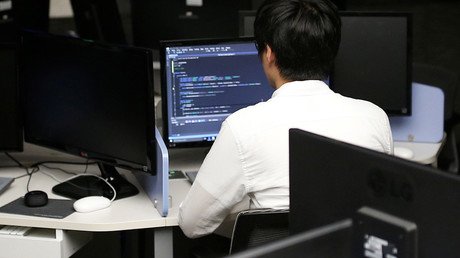Germany is a major target of spying and cyberattacks by foreign states, according to a new government report. The document says it is "assumed" that Russia is seeking to influence the upcoming parliamentary election.
The report by the Bundesamt für Verfassungsschutz (BfV) domestic intelligence agency, released Tuesday, says Germany is a common target of cyberattacks and spying by Turkey, Russia, China and Iran.
It warns of "ticking time bombs" that could manipulate data and sabotage critical infrastructure, and says that industrial espionage costs German industry billions of euros each year.
The most affected sectors are the car, weapons, and space and aerospace industries, along with research institutes, Interior Minister Thomas de Maiziere said on Tuesday. He added that the German government is working alongside industry to better protect German firms.
The report goes on to detail a number of security threats, including Islamist militancy and increased far-right violence. It also highlights the growing occurrence of cyber espionage.
"The consequences for our country range from weakened negotiating positions to high material costs and economic damage all the way to impairment of national sovereignty," the report states.
Key targets were listed as Germany's Foreign Ministry and its overseas offices, the finance and economic ministries, the chancellery, and the German military.
Pointing the finger at Russia
The report specifically mentions Russia, saying it is “assumed” that Moscow is attempting to influence Germany's upcoming parliamentary election on September 24.
"It is assumed that Russian state agencies are trying to influence parties, politicians and public opinion, with a particular eye to the 2017 parliamentary election," the report states.
READ MORE: Claims that Russia hacked elections ‘speculation’ – Austria’s interior minister
It says that the hacker group APT 28, also known as Fancy Bear, which Berlin believes is state-controlled by Moscow, continues to attack German political targets.
It also accuses Moscow of using internet trolls to sway public opinion and spread pro-Russian views, citing an increase in so-called Russian propaganda and disinformation campaigns using social and Russian-backed media.
De Maiziere also reiterated the report's claim that Russia is likely seeking to influence the German election, citing previous alleged efforts in the US and France.
However, French investigators previously admitted they found no trace of Russian hacking in the attack on President Emmanuel Macron's election campaign. The head of the National Cybersecurity Agency of France (ANSSI) said the hack was "so generic and simple that it could have been practically anyone."
The German minister cited a 2015 hack of the lower house of parliament, which was blamed on Russia.
"A large volume of data was taken during the 2015 Bundestag hack," de Maiziere said. "We expect some of that information could emerge in coming weeks."
However, citing a hack which took place last week, domestic intelligence director Hans-Georg Maassen said there is no evidence that Russia was responsible.
Although Russia has not responded to the accusations in the German government report, it has previously done so when it comes to US hacking claims.
"The mere fact that a hacking attack is carried out from the territory of some state is in no way proof that official authorities are involved," Kremlin spokesman Dmitry Peskov said last month.
Turkey, China, Iran
Russia isn't the only country to be blamed for alleged spying and cyberattacks in the new report.
It also mentions a "noticeable increase" in spying by Turkey's MIT foreign intelligence agency in Germany last year, following a failed July 2016 coup in Turkey.
It claims that Turkey targeted backers of the banned separatist Kurdistan Workers' Party (PKK) and the US-based cleric Fethullah Gulen, who Turkey blamed for the attempted coup.
As for China, the report claims that Chinese espionage has increased since President Xi Jinping took office in 2013, and is increasingly centered on political events such as the upcoming G20 summit in Hamburg, along with technology and critics of the Chinese government.
It accuses Chinese intelligence of using social media sites including Facebook and LinkedIn to try to recruit Western informants.
The report also mentions Iran, stating that it is a major culprit of spying and cyberattacks against Germany.


